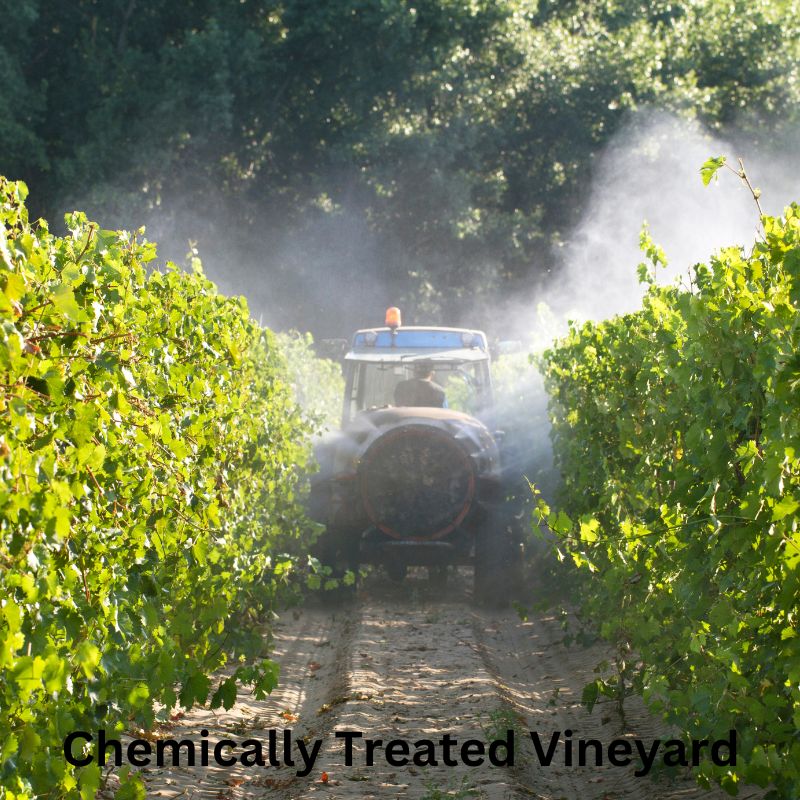Would you care to learn some of the dark secrets of mass-produced wines?
Have you ever stood in the wine section, overwhelmed by the endless selection of these wines? Was it easy to make a selection? You have company. It’s irritating to be a wine lover, having to sort through all of those options. Especially when most will fall short of the depth of flavor and complexity that you’re looking for. What if, however, we told you that behind those bottles lies something sinister?
This reality isn’t always easy to accept. It may be due to questionable manufacturing methods or additives but it will leave you with a less-than-stellar wine drinking experience. Here are some of the mass-produced wine industry secrets that they don’t want you to know. Things like the environmental impact of mass production, their usage of pesticides and herbicides, and the lack of quality grapes used with and without additives. Are you ready to level up your wine knowledge?
Dark Secrets – Mass-Produced Wines Contain Harmful Pesticides and Herbicides
The use of pesticides and herbicides in grape growth is one of the most distressing secrets of mass-produced wines. Crops are sprayed with pesticides to prevent pests and weeds. But, these pesticides can have harmful effects on the environment, the people who manage them, and the people drinking the wine produced from these crops. Some pesticides and herbicides have been shown to be particularly dangerous to human health. In fact, some have been shown to be carcinogenic.
This has resulted in many people changing to organic and biodynamic wines. They are made without the use of pesticides and chemicals. Pesticides and herbicides DO affect the flavor and aroma of wine by contrasting grapes cultivated organically with those grown conventionally.
Dark Secrets – The Quality of Grapes with Additives
While chemical-based pesticides and herbicides are still commonly used, there is a growing trend toward organic and sustainable farming practices for grapes. Because of the absence of potentially harmful compounds, grapes grown organically are regarded as superior to those grown commercially. Wine quality, fragrance, and flavor are negatively impacted by pesticide and herbicide use.
Chemical residues are more likely to form in grapes that were grown using additives. This practice may alter the taste and aroma of the wine. Pesticide and herbicide overuse can also deplete soil minerals, which prevents grapes from taking on the region’s signature flavors. This leads to a wine that tastes generic, like other mass-produced wines, or a wine with no distinctive flavor at all.
Natural grape growing, on the other hand, allows the wine to reflect the region’s characteristics in all its complexity. The flavor and scent of these grapes are truer to the grape variety as they have not been chemically changed. Check this out!
When selecting the best wine, it is vital that you understand how additives impact grape quality. The use of chemical-based pesticides and herbicides threatens human health and may alter the wine’s flavor. Let’s discuss how the winemaking technique affects the finished product when it comes of flavor and level of complexity.
Dark Secrets – Craft Winemaking vs. Mass Production
There is a delicate balance between art and science in the creation of wine. It requires an in-depth understanding of the vineyard’s soil, grape varieties, and fermenting techniques. All of these factors play an important role in determining the wine’s final taste and its overall excellence.
Today many winemakers have adopted a more mechanized and standardized approach with the rise of industrialization and commercialization. High-tech, industrial winemaking typically prioritizes quantity over quality and cost-effectiveness over profit.
There is a huge gap between commercial wine production and artisanal winemaking. Artisanal winemaking involves a more hands-on approach that allows for a greater degree of control over the wine’s flavor and aroma. In contrast, modern machinery, chemicals, and additives used in industrial winemaking can significantly alter the wine’s traditional qualities.
Dark Secrets – Mass Produced Wines Effects on Nature
The environmental effects of wine production are substantial. Production, packaging, and worldwide distribution of wine from large wineries consumes substantial amounts of water, energy, and other resources. Large-scale wine production usually requires farming methods that are harmful to plants and animals. Pesticide and herbicide use in vineyards are linked to soil damage and groundwater contamination.
Commercial winemaking contributes to climate change as it uses high-tech machinery and equipment and consumes a great deal of energy. Diesel-powered vehicles, ships, and planes carry the wines, all adding to carbon emissions and air pollution.
There is no disputing the environmental impact that mass production causes. Sustainable and responsible winemaking practices are essential if the wine industry is to reduce its adverse effects on the environment. Want to lessen any negative influence you have on the planet? Choose wines from small, family-run vineyards that use eco-friendly farming practices like organic farming and sustainable vine management.
Wines made on a large scale tend to be shallow and one-dimensional, making them less interesting and memorable to drink.
Selecting Premium Wines for Enhanced Pleasure
Mass-produced wines are convenient, inexpensive and easily accessible. But their lack of depth makes them easy to forget. Want to savour the complex nature of wine’s flavors? Then, seek out artisanal wineries that use environmentally friendly farming practices. These wineries are more likely to use traditional techniques. They will use a more hands-on approach, resulting in wines that are more flavorful and complex compared to their mass-produced counterparts.
Invest in high quality wine and you will enjoy a superior wine-drinking experience. Fine wines have unique personalities because they are seldom made using modern techniques. Bored with the mass-produced options? Try something from the artisanal wine revolution.
Join a wine club if you long to sample wines you won’t find anywhere else. You will be able to try rare and excellent wines that are not sold in stores.The wine selections offered by most wine clubs are handpicked by professionals in the field. This opens up the possibility of sampling wines you might not have access to otherwise. A wine club is a great way to try new wines and learn about the industry. Whether you’re a seasoned connoisseur or just getting your feet wet, this is the best way to become a wine snob!
There are certain considerations to make before joining a wine club. Before committing to a wine club, it’s important to make sure your tastes and budget are compatible. There are wine clubs that only carry one sort of wine, while others have a much wider variety. Make sure the wine club you’re considering has a good reputation. And, make sure they offer premium wines by reading reviews written by current and former members.
Conclusion
Speaking of wine clubs! You have the opportunity to join this club as a client or as a wine ambassador. You can receive you monthly wine shipments right to your home, directly from Napa and Sonoma Valley vineyards. No middle men or trips to the local stores. Monthly shipments of the finest quality directly to you. And, at unbelievable prices. Can be squeezed into most any budget. Go here to learn more.
There is an easy way to have your monthly shipments delivered for free, just pay for shipping and handling! So, you can be a client or can join our team in spreading the word on this amazing offer!
When you join a wine club, you will receive recommendations tailored specifically to your tastes and discover wines you’ll love. Keep in mind that an excellent bottle produced with love and care can greatly improve your wine tasting experience. Choose carefully and enjoy yourself.
Visit my blog at 2m96.com for more information on many exciting things!
We are available for contact regarding this (or anything related to this Community Information System). See how by CLICKING HERE!





